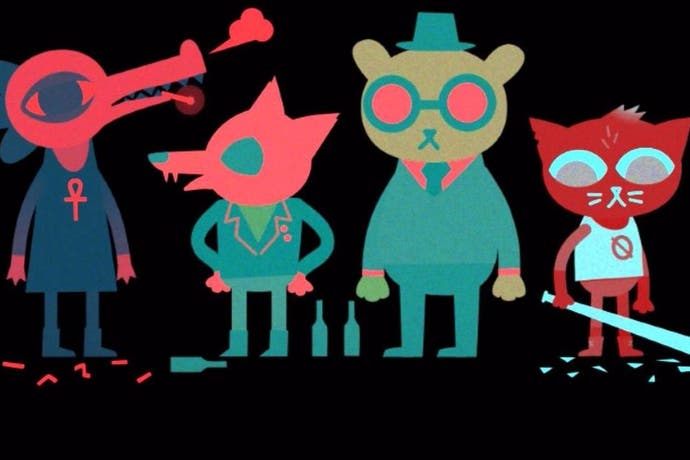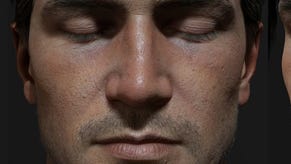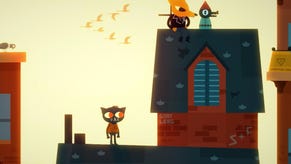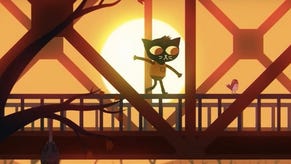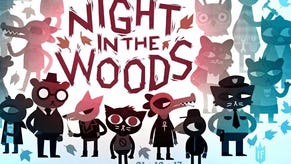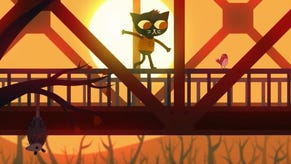Night in the Woods review
Autumn people.
Video games have cast me as a dapper hitman, an alien garbage collector, a chinless vampire and countless other roles, but this is the first time I've been asked to play a mess. Infinite Fall's bleak yet sparkling interactive novel is the tale of Mae Borowski, a feline college drop-out in an allegorical America populated by talking animals, who is crashing with her parents for the winter. The fact that she's a cat who plays bass aside, Mae's most distinctive quality as a protagonist is that she's a total liability - lazy, needy and far younger than her twenty years suggest, with a miraculous knack for saying the wrong thing at exactly the wrong time.
Rather than imposing her will on the world - in keeping with the worn-out view that escapism in a game means being irresistibly powerful - she bumbles through it, sloping off downtown each day at sundown to clamber up buildings, shoplift and hang out with her best buds after they finish work. This adolescent routine persists throughout the game's six hour length, even following a twist that takes the story into suspenseful whodunnit territory - crawl out of bed, hit the high street, bound over fences, steal pretzels, pester exhausted friends for attention.
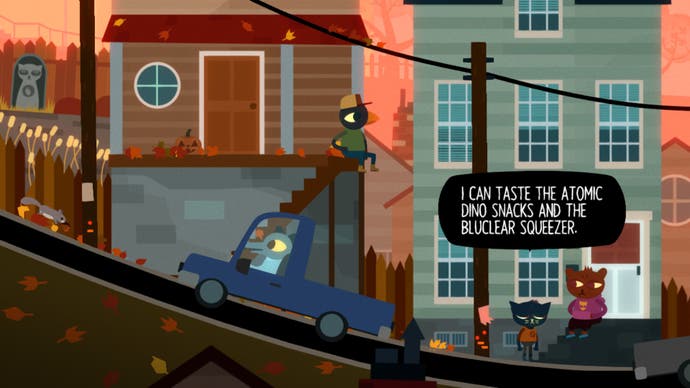
Between trips into town you can also chat with your buddies over social media, and maybe polish off a level or two of Demontower, a delightfully grungy 8-bit dungeon-crawler hidden away on Mae's laptop. The plot does throw up its share of excitement eventually - a macabre discovery outside a diner, a giddy chase, a trip to a museum at night - but excitement is not why Mae has returned to the town of Possum Springs. She's basically here to waste time.
Night in the Wood's throwaway sprinkling of platform-puzzle mechanics almost feel like an extension of the character's fecklessness. You'll need to ascend to the rooftops to speak with certain characters, and there's an element of skill to chaining jumps in order to bounce extra-high on the third, as in Super Mario 64. In large part, though, the platform mechanics are there to be indulged, not mastered - sauntering along telegraph wires that thrum like guitar strings while somewhere below, busybodies mither about vagrants and call centre operators complain of needing drugs to get through the 9-to-5. Similar things could be said of your infrequent ability to pick a response in dialogue, which is usually about adjusting the tone of a conversation or shifting the focus ever so slightly, rather than deciding on a course of action. This is a game that, amongst other things, uses a scarcity of "meaningful" interaction in order to make a point about the protagonist's passivity.
Video game characterisation generally works in two directions, as players both assume a role and assume a role in response to the role they're invited to play. In Mae's case, I quickly found myself settling into the persona of a disapproving older brother. I wanted to yell at her to stop ducking her parents' tentative inquiries about what exactly went wrong at college. I wanted to tell her to give her friends some goddamn breathing room, to stop blundering through delicate conversations about childhood abuse or bipolar disorder. I wanted her to stop saying "like" all the time, to quit breaking out in childish ecstasies over crappy horror movies and pizza.
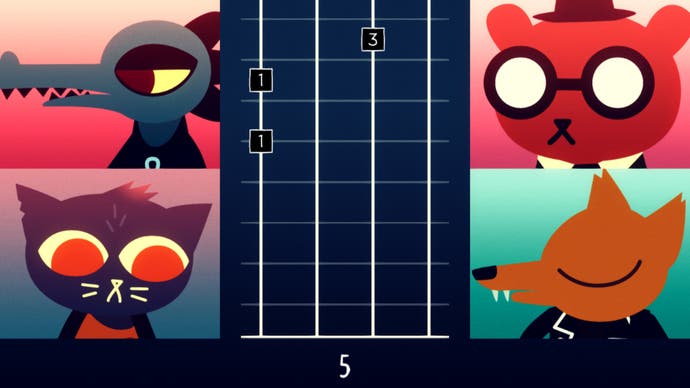
I wanted, most of all, to tell her to stop wasting her evenings at band practice (a splash of Guitar Hero rhythm-matching) and get a job. It was at this stage that I realised that the game had become less about Mae's waywardness - for which there are Reasons - and more about my own uninvestigated privilege and stuffy ideas of grown-up behaviour. Good stories drop us into the shoes of another being. Great ones teach us something about ourselves in the bargain.
Night in the Woods is a great story, at least till Infinite Fall spoils it with a big, clumsy dollop of exposition towards the end. It's an examination of post-industrial America through the lens of a small group of lovable misfits, a homecoming-of-age yarn that leverages both the autumnal melancholy of a Ray Bradbury novel and the kooky ennui of a Garden State. It's a story about old folk grown bitter and vengeful, youngsters struggling to escape dead-end service jobs, and the mundane gestures of affection and solidarity that keep despair at bay. At its most searching, it's also a story about the coldness of a godless universe, though it does leave open a door to faith in some kind of higher power. This side of the game crops up most prominently in Mae's dreams - chapter-bridging trips through cracked midnight expanses of city and forest to a grim folk band accompaniment, where the game is closest in style to a traditional platformer.
Infinite Fall's art direction is superb, arraying the decline of a once-prosperous mining town in rich shades of purple, russet and gold. It's a landscape of peeling store displays, neglected war monuments, scuffed-out murals and framed memorabilia, reaching to a faded sky creased by flights of migrating birds. The score is similarly marvellous, a burble of electronica that shifts naturally from background track to in-world ambient music - the stodgy muzak of a junk food store, the murmur of an acoustic guitar at an outdoor party.
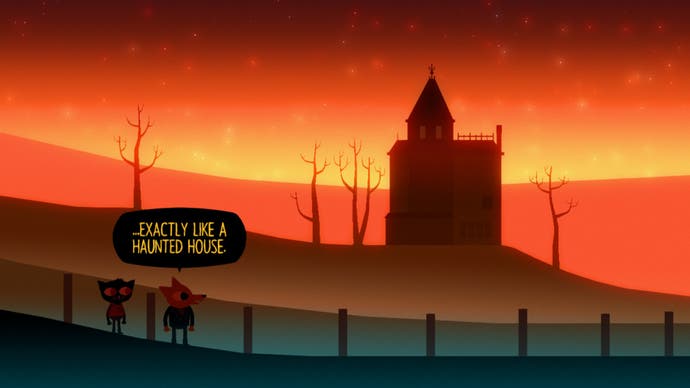
The game's chief strength, though, is its writing, which is whimsical without being frivolous and tender without being maudlin. The core cast strike a balance between archetypes familiar from cinema and portrayals that feel like they're drawn from personal experience. Bea is the spiky yet dependable Goth girl whose disdain for Mae slowly thaws. Gregg is a puckish, troubled soul in a rakish leather jacket, and Angus the stoical big brother figure whose asthma performs a function not unlike Velma Dinkley's mislaid glasses in one, spookier scene. The bit parts are worth knowing too - make a point of getting to the bottom of the mystery, and you may overlook the anxious kid on the rooftop who harbours dreams of being a horror director, or the pastor whose kindness is all the more affecting for her doubts.
It's just a shame that - perhaps taking its cue from Mae's less graceful moments - the ending rides roughshod over much of this nuance, tying up certain themes in a hasty, showy fashion and stating out loud what might have been left unsaid. In some ways this simply reflects the difficulty of the subject matter, but it also reveals a game that hasn't quite reconciled the needs of a realist drama and a B-movie chiller. You could also argue that the game is a little too repetitive - Mae might not have a job, but trundling back and forth between home and town every day certainly feels like one. For the most part, though, Night in the Woods is a triumph, comparable to Gone Home in mood and thrust, but with a delicacy and a humour that is all its own.
